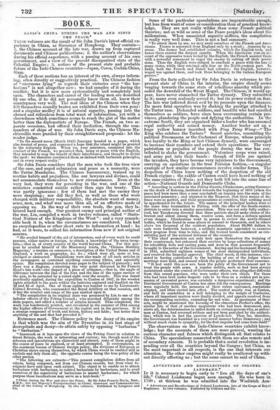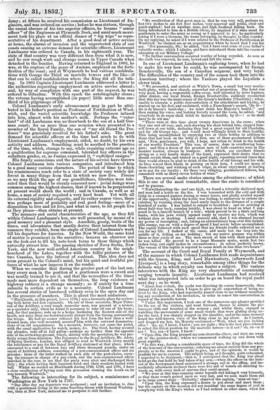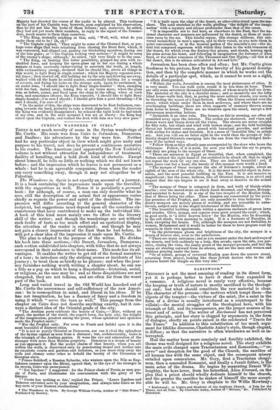ADVENTURES AND RECOLLECTIONS OF COLONEL LANDHANN.* IF it is necessary
to begin early to "live all the days of one's life," Colonel Landmann began soon enough. He was born in 1780; at thirteen he was admitted into the Woolwich Aca-
• Adventures and Recollections of Colonel Landmann, late of the Corps of Royal Engineers. In two volumes. Published by Colburn and Co.
dewy; at fifteen he received his commission as Lieutenant of En- gineers, and was ordered on service; before he was sixteen, through the casual absence of his two superior officers, he became "senior officer" of the Engineers at Plymouth Dock, and amid much merri- ment took his place at an official dinner of "big wigs" as repre- sentative of his department. After a good deal of active service at home, the alarms of invasion and the unprotected state of our coasts causing an extreme demand for scientific officers, Lieutenant Landmann was ordered to Canada, in his eighteenth year. The state of that country was very different then from what it is now, and he saw rough work and strange scenes in Upper Canada when detached to the frontier. Having returned to England in 1803, he was, at the rupture of the peace of Amiens, employed on the forti- fication of the coast; and at Weymouth he had various confabula- tions with George the Third on marten° towers and the like—if that can be called confabulation where the King did all the talk- ing. In 1805 Captain-Lieutenant Landmann addressed a letter to the authorities requesting employment on active service abroad; and, by way of compliance with one part of the request, he was ordered to Gibraltar. With this epoch the autobiography closes ; the veteran having accomplished (on paper) little more than one- third of his pilgrimage of life. Colonel Landmann's early advancement may in part be attri- buted to his father's position as Professor of Fortification at Wool- wich, and the varied scientific knowledge the Professor infused into him, almost with his mother's milk. Perhaps the " vater- land " of old Landmann was no`drs.wback to the son at a half Ger- man court; for on more than one occasion when presented to a member of the Royal Family, the son of "my old friend the Pro- fessor" was graciously received for his father's sake. The great demand for scientific officers at the time had much to do with Lieutenant Landmann's employment, aided, no doubt, by his own activity and address. Something must be ascribed to the practice of the time, which, strange to say, while requiring extreme age as a qualification for supreme command, tolerated boy officers in the subaltern grades, or, as Junius expressed it, "unfledged ensigns." His family connexions and the nature of his service have thrown Colonel Landmann into various companies, and introduced him to a good many curious characters. The period of time to which his reminiscences reach refer to a state of society very widely dif- ferent in many things from that in which we now live. Precise as we may think the age of our grandfathers, liberties were tole- rated then that would be sternly censured now : jovial doings were common among the highest classes, that if known to be perpetrated at present would shock the world; and in Canada, as well as at home' a man of society required a very hard head. Yet with all its external rigidity and etiquette, and its rather coarse vices, there was perhaps more of geniality and real good feeling—more of a disposition to live and let live, and what is rarer, to let people live as they please—than obtains at present.
The manners and social characteristics of the age, as they fell within Colonel Landmann's ken are well presented, by means of a good memory and a pleasant stile. Anecdote, gossip, traits of the times, and adventures that mostly derive their interest from the manners they exhibit, form the staple of Colonel Landmann's work till his departure for America. In the New World, the same kind of matter is prominent in the narrative; because an observer not on the look-out to fill his note-book turns to those things which naturally attract him. The passing sketches of Nova Scotia, New York, and the now well-settled American country in the neigh- bourhood of the Lakes, together with the fuller pictures of the two Canadas, have the interest of contrast. This idea does not seem present to the Colonel's mind, but his quiet and truthful pic- tures of what he saw impress it on the reader. When we consider that during the greater part of the last cen- tury every man in the position of a gentleman wore a sword and was mostly trained to use it, and that the necessities of the times made men more dependent on themselves, the long existence of highway robbery is a strange anomaly; as if society for a tune submits to certain evils as to a necessity. Colonel Landmann has several stories of barefaced robbery even in the open day and in the presence of numbers. This is about the most audacious.
"Blackheath, at this period, [circa 1790,] was a favourite place for review- ing both horse and foot regiments. On one of these occasions, Major Pater- son of the Artillery, a very rough muscular man, was present at a review, as a spectator only, when he found it necessary to take off one of his boots ; and, for that purpose, rode up to a hedge bordering the Eastern side of the heath, not more than one hundred yards distant from the throng surrounding the troops. He had no sooner released his foot from the boot than a well- dressed man, also well mounted, accosted' him with the outward demonstra- tions of an old acquaintance. In a moment, however, out came the pistol, -with the usual application for watch, money, &e. The thief, having secured his plunder, rode off at full gallop—perhaps no further than the opposite side of the reviewing-ground, where, mixing with the spectators, he was per- fectly secure from detection. The Paymaster to the Royal Artillery, Mr. Adair, of Spring Gardens, London, was obliged to send to Woolwich every month the subsistence or pay for the Royal Artillery stationed at that place, which amounted to a sum of between two and three thousand pounds, under an escort of Artillery, soldiers, consisting of a non-commissioned officer and six privates : three of the latter walked on each side of the post-chaise, carry- ing the treasure in charge of a pay-clerk, and the non-commisioned officer marched in the rear, to see that the party were alert and discharged their duty ; the whole having their bayonets fixed and their muskets loaded with ball. Whilst we resided on Blackheath during 1789, 1790, and 1791, I have a clear recollection of having seen this procession crossing the heath on its way towards Woolwich."
The following is interesting for its subject, a reminiscence of Washington at New York in 1797.
"Day after day my departure was postponed ; and an invitation to dine with a gentleman living at the same boarding-house with General Washing- ton, then at New York, induced me to postpone it still further. "My recollection of that great man is, that he was very tall, perhaps six feet two inches to six feet four inches, very reserved and polite, clear and quick-sighted ; had an aquiline nose, and high forehead falling back. On being introduced to him as a British officer, he inquired if it were usual for gentlemen to enter the army as young as I appeared to be ; he particularly asking if I were a German, the name belonging, he thought, to that country. On my replying, he asked if I were related to the Professor of Fortification at Woolwich : he claimed me as an acquaintance when he heard that I was his son. 'Not personally, Sir,' he added, 'but I have read some of your father's valuable works ; which I admire, and have introduced them into the course of education at our Military College.'
" No further conversation occurred worthy of being recorded. As soon as the cloth was removed, he rose, bowed and left the room."
In one of Lieutenant Landmami's exploring tours, when he had to make his way how he could, he was accompanied by Ensign Boucherville, the son of a Canadian seigneur, and very: loyal. The difficulties of the country and of the season took them into the American territory; where the Yankees played the Loyalists a clever trick.
" We proceeded, and arrived at. White's Town, a small but very neatly- built place, with a new church, somewhat out of proportion. The hotel was very good, having a respectable coffee-room, well attended by news hunters. After dinner, our loyal friend, Ensign Boucherville, suddenly recollected that this day was the anniversary of the Queen's birthday [Charlotte] ; when, unable to restrain a public demonstration of his attachment and loyalty, he started up on his feet, and exclaimed, with a Frenchman's accent, 'By 0—! dis is de Queen's burst-day ; we must drink her Majesty's health !' and then raising his voice, and looking fiercely around the room, he added, and everybody in de room shall drink de Queen's health, by G—! or he shall have to do wit me.'
"There were at this time about twenty Americans in the room ; when they one and all rose, and, each drawing his chair behind him, clapped him- self down at our table, declaring they had a great regard for old Charlotte, and for old Georgy too; and would most willingly drink to their healths. This being accomplished by emptying two or three bottles in addition to those that had been on the table at first, one of these goodnatured fellows said,Now, gentlemen, you will, I hope, not refuse to drink to the health of our worthy President. This was, of course, done in overflowing bum- pers ; and then a dozen of the greatest men of both countries were in like manner toasted, always in bumpers. After which, our excellent friends giving us a very hearty shake of the hand, expressed their desire that we should revisit them, and wished us a good night, repeating several times that they would always be glad to drink to the health of old Georgy and his wife. As they waved their hands in putting on their hats, I could see many of them chuckling and winking at each other, in silent enjoyment at leaving us to pay for our loyalty ; for these very obliging, goodnatured fellows, had consumed with us thirty-seven bottles of wine."
There are several snake stories among the adventures; of which this is one of the most remarkable, since the snake is considered not to pursue.
"Notwithstanding the surf ran high, we found a tolerably sheltered spot, and soon had a kettle on the fire. I was benumbed with the cold and with lying in a cramped posture during so many hours, and gladly availed myself of the opportunity, whilst the kettle was boiling, to endeavour to restore cir- culation, by running along the hard sandy beach to the distance of a couple hundred of yards. I was hailed to return to breakfast ; and on arriving at about half-way back, running briskly, I was about to tread on what I sup- posed to be a smooth branch of a tree ; which proved to be a thick and long snake, with his jaws widely :opened ready to receive my foot, which was without shoe or stacking. I need scarcely add, that I was alarmed beyond my power of description ; and, taking an extraordinary leap over this formid- able enemy, ran on with a degree of speed I had never before accomplished. The reptile followed with such speed that my friends loudly exhorted me to run for my life. I dashed at the canoe, and made but one leap into the middle of it, falling on my bedding ; but my native pursuer was within three or four yards of me. The men struck at him with their paddles till he was killed. He proved to be a large Mocassin snake, seven feet two inches long, and eight inches in circumference; in colour perfectly brown. The vencun of this reptile is reputed to cause death in less than two hours."
The account of the Court and Royal Family at Weymouth, and of the manner in which Colonel Landmann first made acquaintance with the Queen, King, and Lord llawkeslnuy, (afterwards Lord Liverpool,) is a long story, remarkable among other things for the delicate way in which royalty can banter a subject. The various interviews with the King are very characteristic of eccentricity verging towards insanity. Lieutenant Landmann had received what was interpreted into an order to go on board the royal yacht next day ; so he went.
"About four o'clock, the yacht was directing its course homewards, then distant full ten miles, when I began to give up all expectation of being no- ticed by the King, who had repeatedly passed close to me without manifest- ing any recollection of his invitation, in order to renew the conversation in regard of the marten° towers. "Under this impression, I took one of the numerous spy-glasses provided for the use of the visitors, and went forward, thence to admire the pic- turesque cliffs and beauties of the scenery ; and whilst there engaged in watching the movements of some small vessels that were gliding along un- der the land, I was sharply slapped on the shoulder, and at the same moment heard the well-known voice of the King close to my elbow. As I turned, and dropped my hat, his Majesty exclaimed—' Well, what are you looking after ? Ay, ay, I know, I know; you are right ; this is the best place whence to select the fittest position for the marten') towers—is it not ? eh, oh—is it not ? Yes, yes—I know, I know.' "Upon this, the King grasped my arm above the elbow, and drew me away aft to the quarter-deck; where we commenced walking up and down with great rapidity.
In this way, during a considerable space of time, the King did the whole of the honours of the conversation; relieving me almost entirely from any per- plexity as to the answers I ought to give, and of the opinions it would be prudent for me to express. The subject being, as I thought, quite exhausted, I expected to be dismissed,—that is, I anticipated that the King was about to let go the fast hold he had taken of my arm,—when the officer on the look- out at the foretopmast-head announced a strange sail in the offing, and im- mediately afterwards declared there were five sail of vessels all standing to- wards us, with every, inch of canvass they could spread.
"We were at this time running under topsails and taking it very leisurely, so that these vessels gained upon us very fast, and we soon made them out to be large armed ships : 'Probably,' observed the captain, men-of-war.'
"Upon this, the King expressed a desire to put ithout and meet them ; but the captain on this occasion did not manifest the same degree of zeal in complying with the King's wishes as I had noticed in other cases, when his
Majesty had directed the course of the yacht to be altered. This tardiness on the part of his Captain was, however, soon explained by his observation, that he did pot like the looks of those fellows ; and, moreover, he added, they had not yet made their numbers, in reply to the signal of the Commo- dore, much nearer to them than ourselves.
"The King, instantly catching at this, said, Well, well, what do you make them out to be ? eh, eh ?' "The Captain replied, They imight be some of the Channel fleet, or per- haps some ships that were returning from chasing the Brest fleet, which, it was rumoured, had slipped out, passing our blockading squadron, during one of the late gales; or '—the Captain looking very serious= it might be some of the enemy's ships; although,' he added, not very likely to be the case.'
"The King, on hearing this latter possibility, grasped my arm with re- doubled force, and keeping his opera-glass up to his eye during a whole minute at least, anxiously endeavouring to ascertain the truth, at length, with extraordinary energy, declared that he should like, above all things in this world, to fight Bony in single combat ; which his Majesty repeated seve- ral times ; than started oft', still holding me by the arm and drawing me away, walked with all the haste he could master, occasionally, halting for a couple of seconds, and fixing his looks on the strange sails, again he exclaimed, in an under tone, should like to fight Bony single-handed ' : then, stamping with his foot, darted away, taking five or six turns more, when the glass was, as before, raised, and fixed upon the ships in the offing, when at each turn, and sometimes oftener, the King repeated, I should like to fight Bony single-handed-1'm sure I should ; I should give him a good thrashing—I'm sure I should, Pm sure of it!' "In the midst of this, the ships were discovered to be East Indiamen, run- ning towards the land, probably to take a fresh departure. At this discovery the King was evidently disappointed ; he relaxed the tight hold he had taken of my arm, and in the next moment I was set at liberty : the King had seized upon the Captain, and walked the deck with him at a very slow pace."




























 Previous page
Previous page